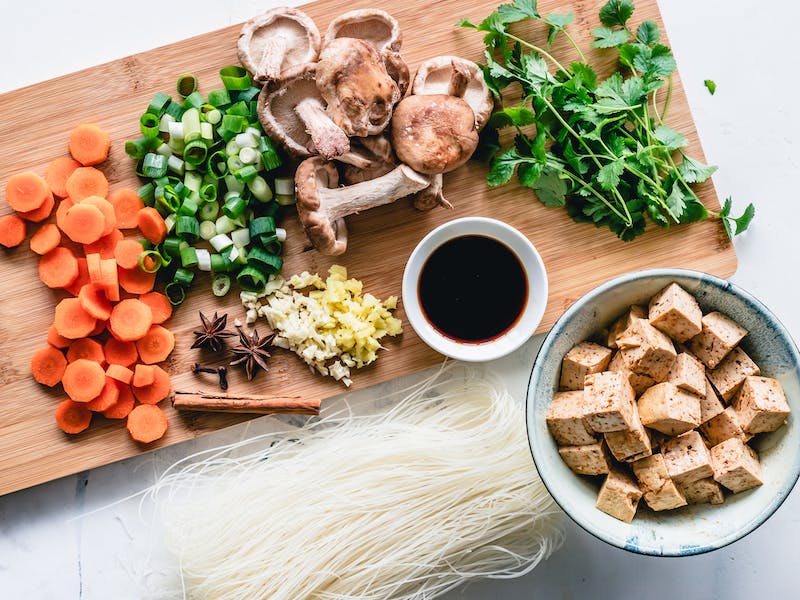Did you know that the number of people following a plant-based diet has quadrupled in the past decade? According to a study by GlobalData, around 6% of Americans now identify as vegan, and over one-third of consumers actively seek out plant-based alternatives. This trend is not just limited to the United States – it’s happening all over the world.
The benefits are numerous. A diet rich in whole plant foods can help lower your risk of chronic diseases such as heart disease, diabetes, and cancer. It can also improve gut health, boost your mood and energy levels, and even aid in weight loss. Not only that but adopting a plant-based diet is also more environmentally sustainable than consuming animal products.
With all these advantages, it’s no wonder that more and more people are choosing to embrace plant-based nutrition as a way of eating. But where do you start when it comes to planning meals on a plant-based diet?
Benefits Of Plant-Based Nutrition
Looking for a healthy way of eating that can benefit your body and the environment? Plant-based eating is the answer!
By eliminating or reducing animal products in your meals, you’ll be consuming more fiber, vitamins, minerals, and antioxidants. These nutrients are essential for maintaining good health, preventing chronic diseases such as heart disease, diabetes, and cancer.
Studies have shown that plant-based diets can also help with weight loss, reduce inflammation in the body, and improve gut health.
Additionally, by choosing to eat more plants instead of meat and dairy products, you’ll be helping to reduce greenhouse gas emissions caused by animal agriculture. So not only is a plant-based diet better for your health, but it’s also better for the planet!
Nutrient-Rich Plant-Based Foods
Including nutrient-dense options like nuts, seeds, and legumes in your diet can provide a variety of important vitamins and minerals. These plant-based foods aren’t just delicious, but they also offer several health benefits.
Here are some nutrient-rich plant-based foods that you should consider adding to your meal plan:
- Chia Seeds: Rich in fiber, omega-3 fatty acids, and antioxidants, chia seeds can help improve digestion and reduce inflammation.
- Lentils: As an excellent source of protein, lentils can aid in muscle growth and repair. They’re also packed with iron, folate, and other essential nutrients.
- Almonds: Almonds are not only a great source of healthy fats but also contain vitamin E, magnesium, and calcium which promote healthy bones.
- Spinach: This leafy green vegetable is low in calories but high in vitamins A, C, and K along with iron and calcium.
By incorporating these nutrient-rich plant-based foods into your diet regularly, you can enhance your overall health while providing the necessary fuel for your body to function correctly.
Building A Balanced Plant-Based Plate
In order to maintain a well-rounded and wholesome vegan meal plan, it’s crucial to incorporate a variety of nutrient-rich options from different food groups.
When building a balanced plant-based plate, start with a base of whole grains such as brown rice or quinoa.
To enhance the nutritional value, incorporate a diverse range of vegetables, such as leafy greens rich in vitamins, cruciferous veggies packed with health benefits, and vibrant produce bursting with essential nutrients.
Next, include sources of plant-based protein such as black beans, lentils, tofu, or tempeh.
Don’t forget about healthy fats found in foods like avocados, nuts, and seeds.

To round out your plate, add in some flavor with herbs and spices or a homemade sauce made from ingredients like tahini or miso paste.
By incorporating these different food groups into your meals you can ensure that you are getting all the necessary nutrients for optimal health while enjoying delicious plant-based meals.
Tips For Meal Planning On A Plant-Based Diet
To make your life easier when switching to a plant-based diet, you can start by creating a weekly meal plan with easy-to-make vegan recipes that will keep you satisfied and energized throughout the day.
Make sure to include plenty of variety in your meals, including different types of grains, legumes, fruits, vegetables, nuts, and seeds. Prepping ingredients ahead of time can also save you time and stress during busy weekdays.
Another helpful tip for meal planning on a plant-based diet is to experiment with new recipes and flavors. Don’t be afraid to try out different cuisines or spices to keep things interesting. Escoffier is an excellent site for training in Vegan meal planning.
You can also use leftovers from one meal as ingredients for another dish later in the week. And remember to always have healthy snacks on hand like fresh fruit or raw veggies with hummus for when hunger strikes between meals.
With some planning and creativity, sticking to a plant-based diet can be both delicious and satisfying.
Plant-Based Protein Sources
Looking for ways to boost your energy and build muscle on a plant-based diet? Have you considered incorporating protein-rich foods like tofu, tempeh, lentils, and quinoa into your meals?
These plant-based sources of protein are not only delicious but also packed with essential nutrients that can help you maintain a balanced diet. Tofu and tempeh are excellent sources of complete protein that can be used in a variety of dishes.
Lentils and quinoa are also great options for those looking to add more protein to their meals. Try adding lentils to soups or stews, or using quinoa as a base for salads.
With these plant-based protein sources, you can easily meet your daily protein needs while enjoying delicious meals that will keep you energized throughout the day.
Incorporating Healthy Fats Into Your Diet
Boost your overall health and satisfy your taste buds by incorporating healthy fats like avocado, nuts, and olive oil into your diet.
Healthy fats can help improve your heart health, lower cholesterol levels, and reduce inflammation in the body.
Avocado is a great source of monounsaturated fats that can help keep you feeling full longer while providing essential nutrients such as fiber, potassium, and vitamin C.
Nuts like almonds, cashews, and walnuts contain omega-3 fatty acids that are important for brain function and can help reduce the risk of heart disease.
Olive oil is another great source of healthy fats that can be used in cooking or as a salad dressing to add flavor while improving your overall health.
When incorporating healthy fats into your diet, it’s important to remember moderation is key. While these fats are beneficial for our bodies, consuming too much can lead to weight gain and other negative consequences.
Aim for about 20-35% of your daily calorie intake to come from healthy fat sources such as avocados, nuts/seeds, olive oil or coconut oil so you get all the benefits without overdoing it.
By adding these foods into your meals on a regular basis you’ll not only improve the nutritional value but also make them more satisfying which will keep you feeling fuller for longer periods throughout the day.
Managing Cravings And Eating Out On A Plant-Based Diet
Now that you’ve learned about incorporating healthy fats into your plant-based diet, it’s time to talk about managing cravings and eating out.
It can be challenging to resist temptations when dining with non-plant-based eaters or dealing with those sudden sugar cravings. But fear not! With a little planning and mindfulness, you can stay on track without feeling deprived.
One way to manage cravings is by keeping healthy snacks on hand like fresh fruit, nuts, or roasted chickpeas.
Additionally, when eating out, don’t be afraid to ask the server for vegan options or modifications to existing dishes. Many restaurants are now offering plant-based menus or alternatives to their meat-centric meals.
Remember that making small changes in your habits over time will lead to significant progress toward achieving a healthier lifestyle.
Long-Term Health Benefits Of A Plant-Based Lifestyle
By adopting a plant-based lifestyle, you can experience long-term health benefits that will improve your overall well-being. Studies have shown that individuals who follow a plant-based diet have a reduced risk of chronic diseases such as heart disease, diabetes, and certain types of cancer.
This is because plant-based foods are naturally low in saturated fat and high in fiber, vitamins, and minerals which help to maintain healthy body functions. In addition to reducing the risk of chronic diseases, a plant-based lifestyle can also promote weight loss and reduce inflammation in the body.
By consuming whole foods such as fruits, vegetables, grains, legumes, nuts, and seeds you provide your body with essential nutrients that support optimal health. Moreover, by focusing on nutrient-dense foods rather than processed or animal-derived products you encourage your body to function at its best potential.
So why not consider adopting a plant-based lifestyle today for better long-term health outcomes?
Frequently Asked Questions
Are There Any Potential Nutrient Deficiencies To Watch Out For On A Plant-Based Diet?
“Watch out for nutrient deficiencies like vitamin B12 and omega-3 fatty acids on a plant-based diet. These can be found in fortified foods or supplements, ensuring you maintain optimal health.”
How Can I Ensure I Am Getting Enough Protein On A Plant-Based Diet?
To get enough protein on a plant-based diet, make sure to eat a variety of legumes, nuts, and seeds. Add soy products like tofu or tempeh for a complete amino acid profile. Consider protein supplements if needed.
Is It Possible To Follow A Plant-Based Diet On A Budget?
Yes, you can follow a plant-based diet on a budget. Focus on whole foods like black beans, lentils, and vegetables. Shop for in-season produce and buy in bulk when possible. Plan meals ahead of time to avoid impulse purchases.
Can A Plant-Based Diet Help With Weight Loss?
Looking to lose weight? Switching to a plant-based diet may be the answer. With high fiber and nutrient-rich foods, you’ll feel fuller longer and consume fewer calories. Get ready for a healthier you!
How Can I Make Sure I Am Getting Enough Variety In My Plant-Based Meals?
To ensure you get enough variety in your plant-based meals, switch up your veggies and grains often. Experiment with new recipes and try different ethnic cuisines. Don’t be afraid to add spices and herbs for flavor.
Conclusion
Congratulations, you’ve made the decision to embrace a plant-based lifestyle! By prioritizing nutrient-rich foods and building balanced plates, you’re setting yourself up for long-term health benefits.
But this is just the beginning. As you continue on your journey, you’ll encounter challenges like managing cravings and eating out.
Don’t worry – with the right strategies in place, you can overcome these obstacles and stay on track. And as more research emerges about the benefits of plant-based nutrition, you can feel confident that your choice is not only good for your body but also good for the planet.
Keep up the great work!




